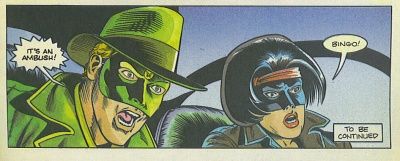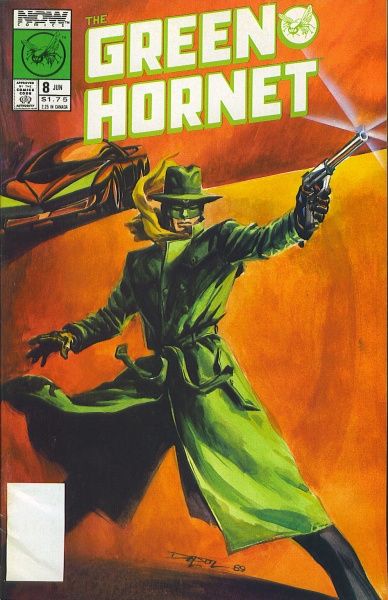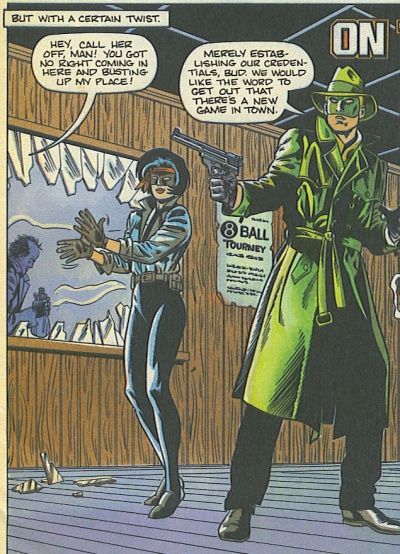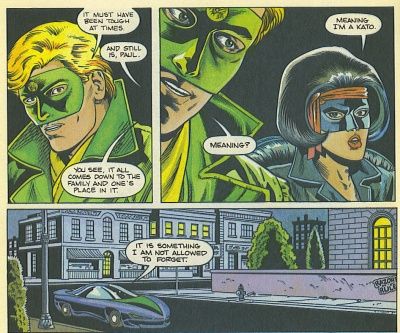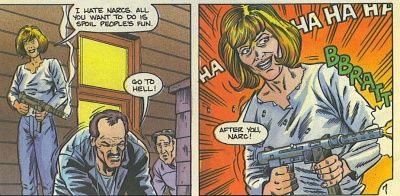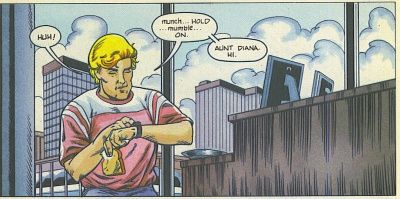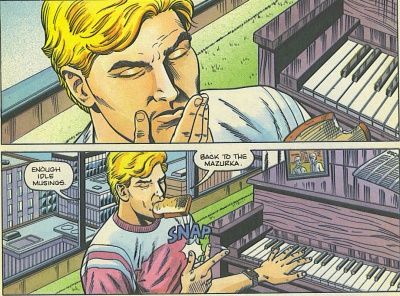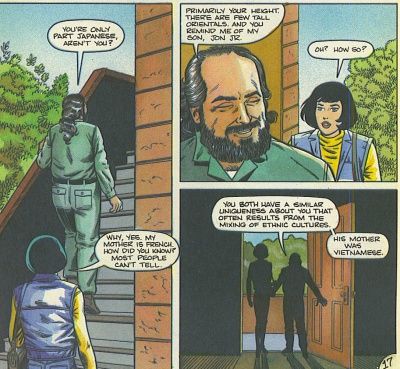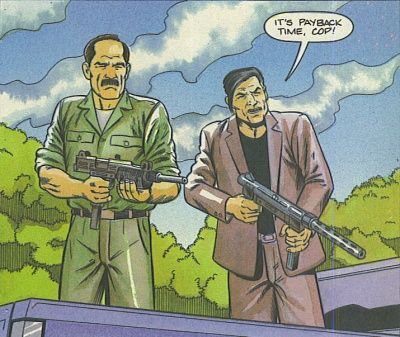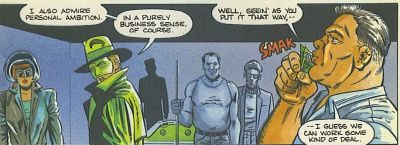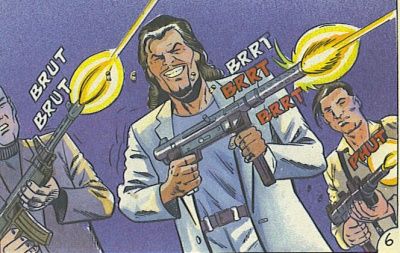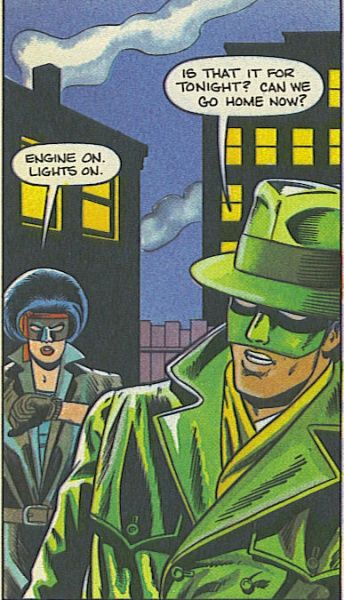This week: a beloved pop culture figure gets updated for the late 1980s/early 1990s ... and the results are less than stellar, to say the least. Read on!
As I do every week, I point you to the ground rules for these posts. It's all about the ground rules!
The Green Hornet #8 ("On thePad")by Ron Fortier, Jeff Butler, and David Mowry. Published by Now Comics, June 1990.
I have very little knowledge about the television series starring the Green Hornet. Bruce Lee was in it. That's about it. But I know about it, and if you were a pop culture gadabout in 1990 looking for a shot of nostalgia, maybe you would pick this comic book up in the hope that it would be something akin to the TV show. Or maybe you, like me, had never seen the show but thought the idea of a man dressed in green calling himself the Green Hornet and dispensing justice with the help of his Asian sidekick would make a good comic book.
Well, it might make a good comic book, but this one is not it. I was always under the impression that the television show wasn't played exactly straight, but had a bit of a wry sense of humor about itself. Even if it didn't, I think that would be a good tone for a comic book to take - lots of action and adventure, but never taking itself too seriously. Like Errol Flynn in The Adventures of Robin Hood! Unfortunately, this book takes itself way too seriously, and therefore it becomes just another lousy comic book trying to be "relevant."
We'll start with our hero and his sidekick, who is Asian but is also female. That's fine. Mr. Hornet ("Paul" is his real name, so that's what I'll call him) is at a bar, telling the bartender that he will pay him good money if "Bud" (the bartender) keeps his eyes and ears open in the neighborhood. Bud objects briefly because he "ain't no stoolie for no one," but then Paul gives him a Benjamin and Bud says he'll do what he can. Here's the funny part - Bud tells Paul this in front of all the patrons in his bar, who look somewhat surly and, well, criminal. They all heard it! How is Bud going to collect any information when everyone knows he's working for the 'Net? We get some decent exposition about Kato, who studied at MIT and grew up with three older brothers. We also learn that "Kato" is the family name, something I didn't know. Was it that way in the TV show, or did we not learn that much about the enigmatic sidekick?
The scene shifts to a police operation, as the cops are about to bust into a small house in a crappy part of town. A few of the cops go around back, where a Miami Vice reject and two henchmen are waiting with automatic weapons. They open fire on the cops, and the two out front wonder why their partners went in early. A bad guy shoots one of them down, and then a woman comes out of the house with a gun and maniacally blows the last cop away. Oh dear.
The next day, Diana Reid, the district attorney, who is recovering from a near-fatal gunshot wound (as the narration helpfully tells us), returns to work. We get some character development, as her co-workers have bought her a first edition Yeats for "her rare book collection." She gets a phone call about the massacre the night before. "Mike," who is a lieutenant in the police force, says he's at Mount Mercy General Hospital. She asks why, and Mr. Sensitive, says, "Keeping company with three cops ... Three dead cops!" What a weird way to put it, Mike! That's why the ladies love him, apparently! Diana isn't much better: when she gets to the hospital, Mike tells her it was supposed to be a routine narcotics raid, and that the cops were the best in the department. Diana replies, "You have your tense right, Lieutenant. Were!" Shit, Diana, you and Mike should take your act on the road! The only survivor was Sandra Maloney, one of the cops who went around the back. Diana doesn't know where to turn, so she calls Paul, her nephew.
This is a surreal little scene between Diana and Paul. She calls him on a fancy wrist-phone, and catches him playing the piano. In thefirst panel, he's playing with both hands as his watch rings. In the next panel, when he answers it, he's holding apiece of breadand chewing ona bite he just took. So he was playing the piano when his watch rang, he stopped, picked up the bread, took a bite, then answered it while his mouth was full. Huh? He continues to eat while he talks to her, as in another panel, more of thebread is gone. Someone needs to teach Paul some manners! She asks if they can meet "at the mansion" later in the afternoon, and they set it up. Then, in a completely extraneous page, Paul thinks for a moment, snaps his fingers, says "Back to the Mazurka" while clutching the piece bread in his mouth (needless to say, much of it is restored - is it a different piece?), then plays while chewing. On the piano is a newspaper with the headline "War on Drugs Escalates" and a picture of Paul and another man outside of a mansion - the same mansion where he's meeting Diana. The final panel focuses in on the photograph, and the narration is weird - "Chopin is the most popular of the piano composers. Like a jeweller, he polished his pieces until they were as perfect as he could make them." What the crap is that supposed to mean?
We catch up with Paul and Diana having a picnic lunch outside of the mansion, which is being restored, I suppose (lots of scaffolding and workers). Diana mentions two cops besides the ones on the raid knew about it, so Diana asks if the Green Hornet could check them out to find the leak. We're not sure if Diana knows that Paul and the Hornet are the same person - the implication is that she does know, but it's never stated. We learn that Kato's name is Mishi, and she's looking for an apartment. We switch scenes to ... Mishi's apartment-hunting! Seriously. We get three pages of her meeting the landlord, Jon, who runs an auto repair shop, and checking out the place. Jon says he can tell that she's only part Japanese, because, he says, "There are few tall Orientals" and she has "a similar uniqueness [to his son]about you that often results from the mixing of ethnic cultures." That's just a weird conversation all around. Mishi likes the apartment, and takes it. Jon better turn outto be a super-villain or a love interest, because three pages of her finding an apartment? Really?
That night the'Net and Mishi followed one of the cops who mightbe crooked.Mishi drives while Paul does research on his computer, and he finds out that Thornston - the cop - is married with two children, one of whom attends Harvard. Mishi says thatmight be agood tell that he's crooked, but Paul points out that his wife is one of the topfive real estate brokers on the EastCoast, so they're loaded. As they follow the car, three motorcyclists pass them - and one of them is the Miami Vice reject who shot the cops! Up ahead is a pick-up truck, and two bad-looking dudes with guns are standing in it. Yes, it's an ambush, as our hero (and Thornston, the cop) suddenly realize. One bad guy says, "It's payback time, cop!" and when the Hornet says that it's an ambush, Mishi says, "Bingo!" The issue, to state the obvious, is to be continued. What the hell? Payback for what, bad guy? And why does Mishi say something as stupid as "Bingo"? So many mysteries!!!!!
In case you haven't figured it out, this is pretty dumb. We're obviously in the middle of a story, and Fortier makes some effort to keep us up to speed, but the storytelling is so disjointed that anyone picking this up on a lark would have no interest in getting another. I mean, Paul doesn't do much in the issue except bribe a bartender and follow a cop (oh, and play piano, of course), and the extraneous stuff - Mishi finding an apartment, for instance - is so incongruous that it puts us off. The issue just doesn't really have much of a flow, which means we can't just go along with it. We're always taken out of the story to wonder why stuff is happening, like why Paul has such poor manners on the phone.
Butler's art is pretty bad, too. Didn't he draw some issues of Badger in the Eighties, as well? I've heard of him, I think, from there. His figures are stiff and look vaguely like posed action figures, and everything has kind of a boxy look to it - he doesn't like the curves, man! In a few panels, he has a really weird sense of perspective - this shot of the bad guys shooting the cops is strange, because the cops are supposed to be in front of them, yet they appear to be shooting to the side:
This is not a very good comic book, but more than that, it doesn't show off why comics are cool. It's dull and rather ugly and doesn't allow a pretty visually cool character like the Green Hornet to really do anything. Again, I get that it's in the middle of a story, and in issue #9, perhaps, our hero flies into action and kicks ass, but there's no real reason for us to return to see it.
In the back of the issue, the Associate Editor of Now Comics, Katherine Llewellyn, writes that the first four issues of the series "sold out," which we all know means jack, really. She also announces that Van Williams, who played the Green Hornet in the television series, is plotting an upcoming mini-series. Wow. I bet that rocked!
Amen to that, GH. Amen to that.

